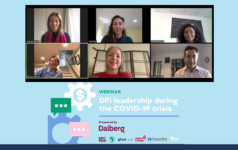Dalberg uses cookies and related technologies to improve the way the site functions. A cookie is a text file that is stored on your device. We use these text files for functionality such as to analyze our traffic or to personalize content. You can easily control how we use cookies on your device by adjusting the settings below, and you may also change those settings at any time by visiting our privacy policy page.
The Capacity Development Organizations and Technical Assistance providers that serve Small and Growing Businesses in emerging economies are at risk of failure. Dalberg partnered with the Aspen Network of Development Entrepreneurs (ANDE) to uncover the scope of the challenges they face and spotlight the help they need. Articles in the Stanford Social Innovation Review and Impact Alpha contain more details.
Stanford Social Innovation Review: How funders can help save an economic engine of the developing world
Roughly 40 percent of SGBs face potential failure in the second half of 2020 due to the crisis, according to the data collected by Dalberg and ANDE. Capacity Development Organizations (CDOs) also face failure — meaning they could no longer provide the support that SGBs rely on. The good news is that many CDOs have quickly adjusted their programming and developed new services to help SGBs respond. But the challenge of CDOs’ own survival still remains. This post in Stanford Social Innovation suggests funders should rethink what a CDO financing model looks like and consider three categories of action, including flexible funds, urgent funds, and new programs.
Impact Alpha: Your pipeline of impact deals in emerging markets is at risk. Three things you can do about it.
ANDE provides a platform for Small and Growing Businesses (SGB) support organizations to connect, learn, share, and expand their work. Many ANDE members are Technical Assistance (TA) providers, and they report a ‘high’ or ‘existential’ organizational risk due to COVID-19. Without TAs, the nascent entrepreneurs that represent the future of high-potential deals for impact investors are less likely to survive the crisis and emerge poised for growth. This would in turn mean that entrepreneurs would be left without the support that is critical to their business’ survival.
So what can impact investors do to ensure that TA providers are able to weather the crisis and keep the deal flow of the future alive? Find five recommendations — from using patient capital to support TA providers to advocating for all actors in the entrepreneurship ecosystem — can be found in this Impact Alpha article.

















